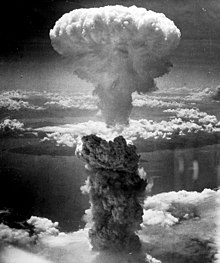1945 in Japan
This article relies largely or entirely on a single source. (March 2019) |
| |||||
| Decades: |
| ||||
|---|---|---|---|---|---|
| See also: | Other events of 1945 History of Japan • Timeline • Years | ||||
Events in the year 1945 in Japan.
1945 was the last year of World War II and the first year of the Allied occupation.
Incumbents[]
- Emperor: Hirohito[1]
- Prime Minister: Kuniaki Koiso, Kantarō Suzuki, Prince Higashikuni, Kijuro Shidehara
- Minister of War: Gen Sugiyama, Korechika Anami
- Minister of the Navy: Mitsumasa Yonai
- Supreme Commander Allied Powers: Douglas MacArthur
Events[]

Atomic bombing of Nagasaki, August 9.

Douglas MacArthur and Emperor Hirohito.
- February 18 - U.S. Marines land on Iwo Jima.
- March 10 - Major bombing of Tokyo
- March 12 - First bombing of Nagoya.
- March 13 - First bombing of Osaka.
- March 26 - U.S. forces win the Battle of Iwo Jima, defeating the last remaining troops led by Tadamichi Kuribayashi.
- April 7 - The Japanese battleship Yamato is sunk.
- April 7 - Suzuki forms his cabinet.
- May 24 - Second major bombing of Tokyo.
- May 29 - First bombing of Yokohama.
- July 26 - Allies issue Potsdam Declaration; Japan refuses to agree to its terms.
- August 6 - Atomic bombing of Hiroshima.
- August 8 - Soviet Union declares war on Japan.
- August 9 - Atomic bombing of Nagasaki.[2]
- August 15 - Last Allied bombing of Japan takes place in Odawara and Tsuchizaki.
- August 15 - Emperor Hirohito declares Japan's acceptance of the Potsdam Declaration.
- August 30 - Douglas MacArthur arrives in Japan.
- September 2 - Japanese officials sign instrument of surrender on the deck of the USS Missouri.
- 24 September - Hirohito says that he did not want war and blames Tojo for the attack on Pearl Harbor
- October 2 - Office of the Supreme Commander Allied Powers is established at the Dai-Ichi Seimei Building in Tokyo.
- October 5 - Higashikuni cabinet resigns.
- October 9 - Shidehara cabinet is formed.
- October 15 - Peace Preservation Law is repealed.
- October 31 – A news agency, Dōmei, officially disbanded, on following day, the news agency operation in nationwide, which separated into Kyōdō News Service and Jiji Press.[citation needed]
- December 17 - Women's suffrage is granted in Diet elections.
- December 18 - House of Representatives is dissolved: Diet elections called for April 1, 1946.
Births[]
- January 6: Toshiko Hamayotsu, politician
- January 29: Yoko Shinozaki, volleyball player
- February 16: Masataka Itsumi, television announcer and singer (died 1993)
- February 25: Toshikatsu Matsuoka, politician (died 2007)
- March 7: Sadakazu Tanigaki, politician
- March 13: Sayuri Yoshinaga, actress
- March 14: Komaki Kurihara, actress
- June 9: Yūji Aoki, manga artist (died 2003)
- June 14: Hiroshi Miyauchi, actor
- July 6: Kyōzō Nagatsuka, actor
- July 7: Ikezawa Natsuki, author
- July 10: Katsuji Mori, voice actor and narrator
- July 19: Kenji Kimura, volleyball player
- July 25: Masakatsu Morita, Tatenokai member (died 1970)
- August 6: Yoshinori Sakai, Olympic flame torchbearer
- August 20: Tomio Sumimoto, sprint canoer
- August 22: Tamori, entertainer
- September 3: Fusako Shigenobu, leader of the Japanese Red Army
- September 12: Yumiko Fujita, actress
- October 2: Shigenobu Murofushi, athlete
- October 9: Kiyoko Suizenji, enka singer
- October 19: Shigeo Nakata, wrestler
- October 25: Keaton Yamada, voice actor and narrator
- November 16: Haruko Okamoto, figure skater
- December 15: Kimiko Kasai, jazz singer
- December 23: Noriko Tsukase, voice actress (died 1989)
Deaths[]
- January 9: Shigekazu Shimazaki, career officer
- February 26: Sanji Iwabuchi
- March 22: Takeichi Nishi
- March 26: Tadamichi Kuribayashi
- April 1: Gōtarō Ogawa
- May 11: Kiyoshi Ogawa, naval aviator (suicide)
- March 17: Tatsugo Kawaishi, swimmer (b. 1911)
- April 16: Toshiko Tamura, novelist (b. 1884)
- May 16: Shintarō Hashimoto, admiral (b. 1892)
- May 21: Prince Kan'in Kotohito, Chief of Army General Staff (b. )
- June 3: Fusashige Suzuki, athlete
- June 7: Kitaro Nishida, philosopher (b. 1870)
- June 22: Isamu Chō, officer (suicide)
- June 23: Mitsuru Ushijima, general (suicide)
- August 6: Senkichi Awaya, mayor of Hiroshima
- August 15:
- Korechika Anami, war leader (suicide)
- Matome Ugaki, admiral
- August 16: Takijirō Ōnishi, admiral (suicide)
- August 17: Shimaki Kensaku, author (b. 1903)
- August 20: Masahiko Amakasu, officer (suicide)
- August 24:
- Midori Naka, stage actress (b. 1909)
- Shizuichi Tanaka, general (suicide)
- September 9: Yoshitsugu Tatekawa, lieutenant-general
- September 12: Hajime Sugiyama, field marshal (suicide) (b. )
- September 14: Kunihiko Hashida, physician and physiologist (suicide)
- September 20: Chōtoku Kyan, Okinawan karate master
- September 26: Kiyoshi Miki, philosopher
- October 15: Mokutaro Kinoshita, author, Dramaturge, poet, art historian and literary critic
- October 18: Yoshiki Hayama, writer (b. 1894)
- October 28: Kesago Nakajima, lieutenant-general
- November 30: Shigeru Honjō, general (suicide)
- December 13: Goro Shiba, military leader during the Boxer Rebellion (b. )
- December 16: Fumimaro Konoe, former prime minister (suicide) (b. 1891)
See also[]
References[]
- ^ "Hirohito | Biography, Accomplishments, & Facts". Encyclopedia Britannica. Retrieved 27 March 2019.
- ^ "In pictures: Nagasaki bombing". BBC News. 8 August 2015. Retrieved 30 April 2021.
Categories:
- 1945 in Japan
- 1940s in Japan
- Years of the 20th century in Japan
